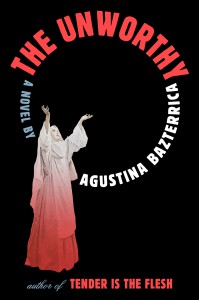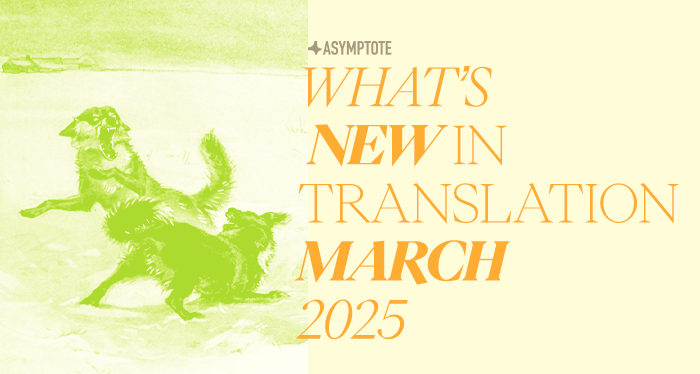This month, our selection of noteworthy titles include a collection of revolutionary Hindi poetry, an erotic thriller from an extraordinary Chilean modernist, an incisive novel concerning the disabled body in contemporary Japan, an intimate socio-philosophical contemplation of a loved one’s life and death by one of France’s foremost intellectuals, and more.

The Unworthy by Agustina Bazterrica, translated from the Spanish by Sarah Moses, Scribner, 2025
Review by Xiao Yue Shan
There’s something seductive about the nightmare, perhaps because fear is the most vivifying sensation, perhaps because beauty and horror are so finely intertwined. In Agustina Bazterrica’s The Unworthy, the night-terror has never looked so exquisite, so shimmering. With an eye for the luminous and ear for the otherworldly, familiar gothic tropes are here relieved from their muted gloom; a chimeric language sings the shadows awake, and in this chorus even the most basic signifiers of darkness regain their fearsomeness, mysticism, sensual enthrallment. The cockroach has a gleam, a crunch; a derelict cathedral is as diaphanous as a dragonfly’s wing. There are the recognisable plot-pieces—violent sacraments, echoing halls, and a wasted world—but those who command fear’s aesthetic know that the most disturbing capacity of pain and transgression lies not in their repellence, but their strange and unpronounceable allure. It is not the torturous that Bazterrica is adept at bringing to life, but the smile that slowly creeps across the face of the tortured, when they are somewhere we can no longer reach.
The Unworthy is a post-apocalyptic convent story, wherein the only known patch of livable land is occupied by the House of the Sacred Sisterhood, a cult that is at once spiritually vacuous and deeply devotional, with its faith reserved more for the House’s singular rites, rituals, and rules than any principle or entity. As is the standard for any secluded sect that positions oblivion as the only alternative to obeyance, the Sisterhood’s hierarchy is strict and immovable, the leaders are mysterious and merciless, the eroticism is violent, the violence is erotic, and the practices are senseless but methodical. The founder and head of the House is a man, but in the name of Sisterhood, all his acolytes are woman: some are servants, some are the Unworthy, some are Chosen, some are Enlightened—and only this latter group is given contact with the one known only as He. One guess as to what that means. Our nameless narrator wants to rise through the ranks, but stubborn fragments of selfhood prevent her from completely assimilating into the Sisterhood’s processions. She still has memories, desires—though they are but frayed remains. READ MORE…



Compass and Rifle: On Roque Dalton’s Stories and Poems of a Class Struggle
No one escapes Dalton’s inquisitive pen . . .
Stories and Poems of a Class Struggle by Roque Dalton, translated from the Spanish by Jack Hirschman, Seven Stories Press, 2023
On Thursday, July 6, 2023, the inaugural day of Guatemala’s International Book Fair (FILGUA), the government of El Salvador requested organizers to exclude Salvadoran author Michelle Recinos’ Sustancia de hígado (F&G Editores) from the fair. The next day, online news outlet elfaro revealed that El Salvador’s ambassador in Guatemala had said, “It would’ve been an unpleasant thing for the government of El Salvador if this book had been a part of the fair.” Details are scarce, but presumably, this action was related to Michelle’s story Barberos en huelga, winner of the 2022 Mario Monteforte Toledo Prize, which openly criticizes sitting president Nayib Bukele’s war on gangs.
Hearing this, I can only imagine what Roque Dalton would have written about Bukele.
Roque Dalton’s Historias y poemas de una lucha de clases (Stories and Poems of a Class Struggle) dates back to 1975, and remains as timely as ever. In a time when most Central American countries are under authoritarian regimes and have experienced backslides of democracy, the life and work of Roque Dalton is at once a beacon of hope, an inspiration, and a warning sign. Historias y poemas de una lucha de clases is a book filled with courageous testimony, the poet’s typical dry humor, and bone-chilling depictions of state violence. Here, Dalton is hyperaware of the pain and plight of his compatriots, but in addition to his typical grittiness and social critique, we also find tenderness, softness, beauty, and frailty; Dalton’s acute perception is both a rifle and a compass, manifesting in words of both rebuke and encouragement.
READ MORE…
Contributor:- José García Escobar
; Language: - Spanish
; Place: - El Salvador
; Writers: - Alaíde Foppa
, - Carlos Fonseca
, - Ernesto Cardenal
, - Jack Hirschman
, - Jaime Barba
, - Julio Delfos Marín
, - Luis de Lión
, - Luis Melgar Brizuela
, - Margaret Randall
, - Michelle Recinos
, - Otto René Castillo
, - Roque Dalton
; Tags: - authoritarianism
, - Central American literature
, - class struggle
, - elfaro
, - F&G Editores
, - fascism
, - FILGUA
, - Mario Monteforte Toledo Prize
, - Salvadoran literature
, - Salvadoran poetry
, - Seven Stories Press
, - social commentary
, - social critique
, - state violence